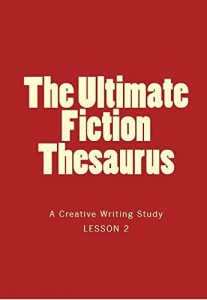Beyond the inspirational support most books offer, I can assure you that two things, and only two, are guaranteed to improve your writing. These are reading and the act of writing itself. The Ultimate Fiction Thesaurus II is a unique literary thesaurus that bridges the gap of reading by taking common descriptive devices and words and places them into usable categories that will serve as a ready toolbox for your own writing.
Let’s see how this works...
First we start with a description:
The morning was sunny.
This is okay, in fact sometimes simple is best, but let’s give it another swing:
A shaft of light pierced the window.
Sunlight flooded the bedroom.
An easterly sun streamed into the kitchen.
Now try a few of these other lighting concepts on your own: dappled, beat down, glinted off, streaked, filtered, drenched
You can immediately see the limitations of a traditional thesaurus; they are helpful at supplying a literal equivalent, such as sunlit for sunny, but frequently miss the finer nuances of language.
Let’s try another quick example and this time we’ll ruin our perfect day:
The morning was thick with fog.
This clearly conveys an idea but with a little effort we can improve this description also.
The morning was shrouded in fog.
Fog settled like a blanket over the city.
I cheated on this last example, using not one but two words frequently associated with fog, the second being blanket.
The Ultimate Fiction Thesaurus II is a continuing study of common literary ideas that will teach you how to think like a novelist.
This lesson is approximately thirteen pages in length and is ideal for beginning and intermediate fiction writers.
Let’s see how this works...
First we start with a description:
The morning was sunny.
This is okay, in fact sometimes simple is best, but let’s give it another swing:
A shaft of light pierced the window.
Sunlight flooded the bedroom.
An easterly sun streamed into the kitchen.
Now try a few of these other lighting concepts on your own: dappled, beat down, glinted off, streaked, filtered, drenched
You can immediately see the limitations of a traditional thesaurus; they are helpful at supplying a literal equivalent, such as sunlit for sunny, but frequently miss the finer nuances of language.
Let’s try another quick example and this time we’ll ruin our perfect day:
The morning was thick with fog.
This clearly conveys an idea but with a little effort we can improve this description also.
The morning was shrouded in fog.
Fog settled like a blanket over the city.
I cheated on this last example, using not one but two words frequently associated with fog, the second being blanket.
The Ultimate Fiction Thesaurus II is a continuing study of common literary ideas that will teach you how to think like a novelist.
This lesson is approximately thirteen pages in length and is ideal for beginning and intermediate fiction writers.






